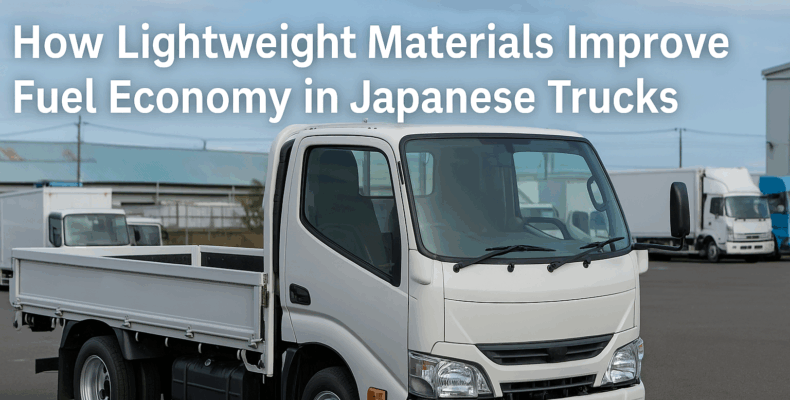How Lightweight Materials Improve Fuel Economy in Japanese Trucks
Fuel costs are rising around the world. As a result, fuel economy has become a top priority for both fleet operators and independent truck buyers. Japanese truck manufacturers have responded by integrating lightweight materials into their designs—without sacrificing strength or safety.
In this article, we’ll explore how lightweight construction contributes to better mileage, faster acceleration, and reduced emissions. We’ll also introduce the top 5 trusted Japanese used truck exporters who can help you get the most efficient vehicle for your needs.
1. Why Weight Matters for Fuel Efficiency
Let’s start with a basic principle: heavier trucks consume more fuel. Every extra kilogram puts more strain on the engine. This means more energy is required to move the vehicle forward, especially during acceleration.
Lightweight trucks, on the other hand, need less energy to operate, and that translates directly into better fuel economy. But there’s more to it.
2. Key Lightweight Materials Used in Japanese Trucks
Japanese manufacturers such as Isuzu, Hino, Mitsubishi Fuso, and Toyota have adopted several modern materials to reduce weight while maintaining durability.
✅ High-Strength Steel
This steel is thinner but stronger than traditional types. It’s used in truck frames and cabs to reduce mass without compromising safety.
✅ Aluminum Alloys
Lightweight yet rust-resistant, aluminum is now commonly found in wheels, body panels, and fuel tanks.
✅ Resin & Plastic Composites
Non-structural parts like dashboards, bumpers, and trim use resin materials that weigh less than metal alternatives.
✅ Lightweight Suspension Components
Using forged aluminum or lighter springs helps reduce unsprung mass, which improves handling and fuel efficiency.
3. Real Benefits for Truck Owners
Choosing a truck built with lighter materials leads to several practical advantages:
-
Lower fuel consumption on both highways and city roads
-
Improved acceleration and braking
-
Higher payload capacity, since less vehicle weight = more cargo potential
-
Reduced wear and tear on tires and suspension
All of these benefits can help extend your truck’s lifespan and cut long-term operating costs.
4. Models That Use Lightweight Design
Here are a few popular Japanese trucks that incorporate fuel-saving lightweight materials:
| Model | Notable Feature | Fuel Efficiency |
|---|---|---|
| Isuzu Elf | Aluminum transmission housing | ★★★★☆ |
| Hino Dutro | Lightweight frame & cab | ★★★★☆ |
| Fuso Canter | Resin bumpers, Eco-Drive assist | ★★★★☆ |
| Toyota Dyna | Compact diesel engine + light body | ★★★★☆ |
These models are well-suited for export, especially to regions where fuel is expensive or cargo space is limited.
5. Where to Buy Efficient Japanese Trucks
If you’re ready to import a lightweight, fuel-efficient Japanese truck, choose an exporter you can trust.
👉 Visit this article to see our top picks:
Top 5 Trusted Japanese Used Truck Exporters for Global Buyers
These exporters offer:
-
Rigorous vehicle inspection
-
Logistics and customs support
-
Flexible shipping options
-
Expert knowledge on truck features and specs
Wherever you are—in Africa, the Caribbean, or Southeast Asia—these companies can deliver quality and value.
6. Final Thoughts
In conclusion, lightweight construction is one of the smartest paths to fuel savings. Japanese truck makers are leading the charge by using advanced materials to improve mileage without reducing strength.
So, if you’re searching for a truck that works hard and saves fuel, look no further than Japan. And don’t forget to check out the most trusted exporters who can help you every step of the way:
👉 Top 5 Trusted Japanese Used Truck Exporters for Global Buyers
With the right vehicle and the right exporter, your business will go further—for less.
